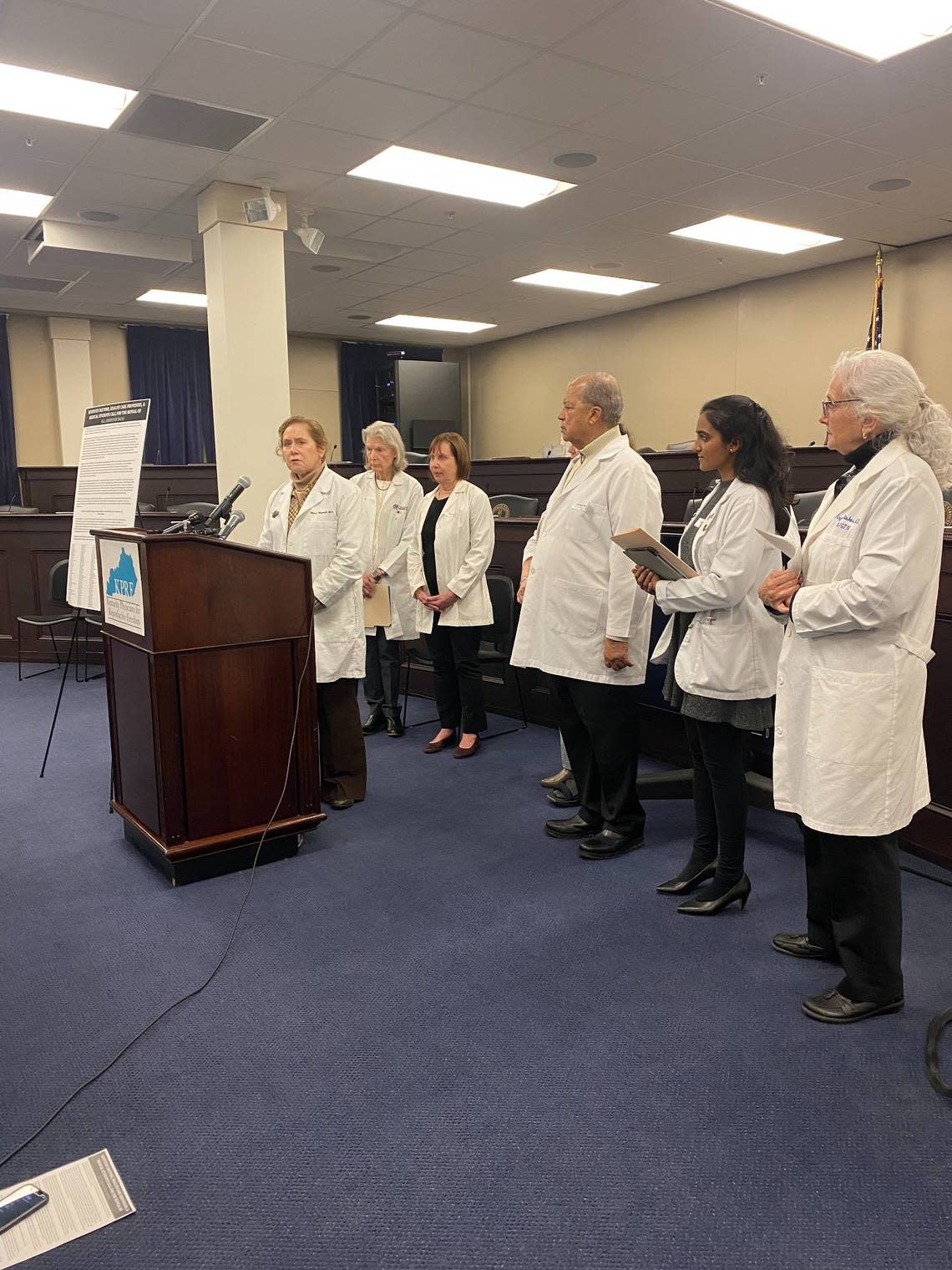Hundreds of Kentucky doctors ask lawmakers to repeal abortion ban: ‘Don’t tie my hands’
A group of roughly 280 Kentucky physicians have signed an open letter to lawmakers asking them to repeal Kentucky’s laws banning abortion.
In a Wednesday news conference in Frankfort, a handful of those physicians, part of the group Kentucky Physicians for Reproductive Freedom, restated that demand.
“This is a call to action,” said Dr. Marjorie Fitzgerald. “Abortion bans do nothing to protect patients’ rights or privacy. We call on legislators to listen to physicians and leading health care organizations to repeal the ban on abortion.”
But in a state controlled by Republicans — the majority party that has enacted a bevy of abortion restrictions in the last decade, responsible also for the two laws currently banning the procedure — the group’s calls to action are surely to go unanswered.
Dr. Nancy Newman, a Louisville-based OBGYN who first received her license to practice medicine in Kentucky in 1988, according to the Kentucky Board of Medical Licensure, said if the health care landscape looked then how it looks now, she wouldn’t have stayed in Kentucky.
“Would I come to the state now? No, I would not,” Newman said. She blamed legislators for creating a “culture of fear” by enacting numerous restrictions on pregnancy termination, which is an evidence-based aspect of OBGYN health care.

Dr. Michelle Elisburg, a Louisville pediatrician, recounted treating a 14-year-old patient who was raped by her 60-year-old landlord, and the child carried her pregnancy to term.
“Many of my patients are indigent and have very few resources when they have their baby,” she said. “Is this what we want for our children?”
Dr. Virginia Stokes, an OBGYN in Louisville, said, “what defines and necessitates abortion is nuanced,” but the wholesale ban does not account for those nuances.
Pregnancy complications that compromise a fetus’ ability to survive outside the uterus “occur with remarkable frequency,” she said. But even in cases of nonviable pregnancies, providers cannot lawfully terminate a pregnancy as long as there is cardiac activity.
“Failure to provide that standard treatment risks the patient’s life,” Stokes said. “I am pro-life. I am for saving the life of these women who have pregnancy complications that require a cessation of the pregnancy. Let us, as lawmakers and influencers, come together to find a way to allow these families’ decisions to be made privately and in the counsel of trusted caregivers.”
As an OBGYN, Stokes said, “my first priority is the life of my female patient. Please don’t tie my hands.”
Kentucky’s near-total abortion ban became enforceable in June 2022, when the U.S. Supreme Court overturned Roe v. Wade, locking the state’s trigger law into place. The trigger ban outlaws abortion in all cases, unless the medical procedure is “necessary to prevent the death or substantial risk of death . . . or to prevent the serious permanent impairment of a life-sustaining organ of a pregnant woman,” according to the language of the bill, which was passed into law in 2019.
A separate six-week ban, or fetal heartbeat law, also took effect when Roe fell. It bans the medical procedure after fetal cardiac activity is first detected, usually around the sixth week of pregnancy.
Neither law includes exceptions for pregnancy cause by rape or incest, or if a pregnancy is diagnosed with a fatal fetal anomaly that is incompatible with life. A Republican and Democrat have filed bills this session to add exceptions for rape, incest and nonviable pregnancies, such as an incomplete miscarriage, an ectopic pregnancy, or any condition that makes survival impossible.
Under the bill from Rep. Ken Fleming, R-Louisville, a person made pregnant through rape or incest could only lawfully get an abortion as long as it’s provided “no later than six weeks” into pregnancy.
While doctors agreed that increased access to abortion, even through added exceptions, is necessary, Newman said the six week time frame was “not realistic.”
“That time frame is not reasonable; most women don’t even know they’re pregnant at six weeks,” Newman said. “I think there should be exceptions, but to limit it to six weeks is outside the scope of treatment.”
